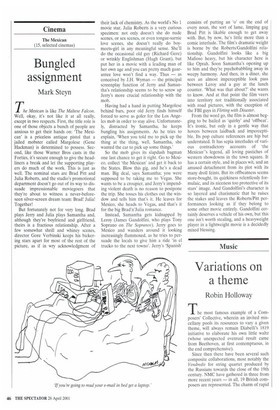The Mexican (15, selected cinemas)
Bungled assignment
Mark Steyn
The Mexican is like The Maltese Falcon. Well, okay, it's not like it at all really, except in two respects. First, the title role is one of those objects a bunch of people are anxious to get their hands on: 'The Mexican' is a priceless antique pistol that a jailed mobster called Margolese (Gene Hackman) is determined to possess. Second, like those Warner Bros casts in the Forties, it's secure enough to give the headliners a break and let the supporting players do much of the work. This is just as well. The nominal stars are Brad Pitt and Julia Roberts, and the studio's promotional department doesn't go out of its way to dissuade impressionable moviegoers that they're about to witness a never-beforeseen silver-screen dream team: Brad! Julia! Together!
But fortunately not for very long. Brad plays Jerry and Julia plays Samantha and, although they're boyfriend and girlfriend, theirs is a fractious relationship. After a few somewhat shrill and whiney scenes, director Gore Verbinski keeps his bickering stars apart for most of the rest of the picture, as if in wry acknowledgment of their lack of chemistry. As the world's No 1 movie star, Julia Roberts is a very curious specimen: not only doesn't she do nude scenes, or sex scenes, or even tongue-sarnie love scenes, she doesn't really do boymeets-girl in any meaningful sense. She'll do the occasional old guy (Richard Gere) or wrinkly Englishman (Hugh Grant), but put her in a movie with a leading man of her own age and you can pretty much guarantee love won't find a way. Thus — as conceived by J.H. Wyman — the principal screenplay function of Jerry and Samantha's relationship seems to be to screw up Jerry's more crucial relationship with the mob.
Having had a hand in putting Margolese behind bars, poor old Jerry finds himself forced to serve as gofer for the Los Angeles mob in order to stay alive. Unfortunately, distracted by Samantha, he keeps bungling his assignments. As he tries to explain, 'When you told me to pick up the thing at the thing, well, Samantha, she wanted the car to pick up some things.'
So the mob gives its slapdash bagman one last chance to get it right. Go to Mexico, collect 'the Mexican' and get it back to the States. Blow this gig, and he's a dead man. Big deal, says Samantha; you were supposed to be taking me to Vegas. She wants to be a croupier, and Jerry's impending violent death is no reason to postpone the trip. She tosses his clothes out the window and tells him that's it. He leaves for Mexico, she heads to Vegas, and that's it for the big Brad'n'Julia romance.
Instead, Samantha gets kidnapped by Leroy (James Gandolfini, who plays Tony Soprano on The Sopranos). Jerry goes to Mexico and wanders around it looking increasingly flummoxed, as he tries to persuade the locals to give him a ride 'in el truck° to the next towno'. Jerry's 'Spanish' consists of putting an `o' on the end of every noun, the sort of lame, limping gag Brad Pitt is likable enough to get away with. But, by now, he's little more than a comic interlude. The film's dramatic weight is borne by the Roberts/Gandolfini relationship. Gandolfini looks like a big Mafioso heavy, but his character here is like Oprah. Soon Samantha's opening up to him and they're psychobabbling away in weepy harmony. And then, in a diner, she sees an almost imperceptible look pass between Leroy and a guy at the lunch counter. 'What was that about?' she wants to know. And at that point the film veers into territory not traditionally associated with road pictures, with the exception of the FBI guys in Flirting with Disaster.
From the word go, the film is almost begging to be hailed as 'quirky' and 'offbeat'. It's ironic, but only in a gentle way that hovers between laidback and imperceptible. Its pop culture references are hip but understated. It has sepia interludes of various contradictory accounts of 'the Mexican' s legend, all loving pastiches of western showdowns in the town square. It has a certain style, and in places wit, and an amused detachment from its plot with its many droll feints. But its offbeatness seems store-bought, its quirkiness relentlessly formulaic, and its niceness too protective of its stars' image. And Gandolfini's character is so layered and charismatic that he raises the stakes and leaves the Roberts/Pitt performances looking as if they belong to some other movie entirely. Gandolfini certainly deserves a vehicle of his own, but this one isn't worth stealing, and a heavyweight player in a lightweight movie is a decidedly mixed blessing.


































































 Previous page
Previous page